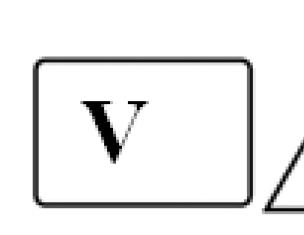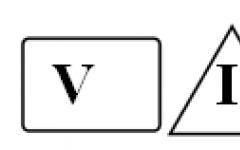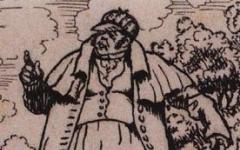Despite the fact that the basis of Gavrila Derzhavin’s work is Russian classicism, it significantly went beyond its limits. Derzhavin's poems are characterized by a combination of “high” and “low” elements, a mixture of solemn ode with satire, colloquial expressions along with Church Slavonic vocabulary. A romantic approach to reality also creeps into the poet’s works. In other words, Derzhavin’s work expressed the entire development path of Russian literature of this era - from classicism, through sentimentalism and romanticism to realism.
The poet considers truth to be the basis of art, which artists and poets are obliged to convey to the reader. The task of art is to imitate nature, that is, objective reality. But this does not apply to the base and rough sides of life - poetry, as Derzhavin believes, should be “pleasant.” It should also be useful - this explains the numerous moral teachings, satires and morals with which the poet’s work is replete.
Derzhavin, of course, could not pretend to be a spiritual people's leader and encroach on the foundations of autocracy, but in many works he expresses precisely the people's point of view, which was already a breakthrough for Russian literature of the 18th century. Thus, the impressions of Pugachev’s peasant war were reflected in all the poet’s most important poems - from “Chitalagai Odes” to “Nobleman” - in them he is on the side of the people, condemning their torment by landowners and nobles.
Since 1779, Derzhavin’s work has become more and more original - he follows his own path in poetry. Derzhavin’s merit to Russian poetry is the introduction of the “funny Russian style” into literature: a combination of high style with vernacular, satire and lyricism.
Derzhavin expands the themes of poetry, bringing it closer to life. He begins to look at the world and nature through the eyes of an ordinary earthly person. The poet depicts nature not abstractly, as was done before him, but as a living reality. If before Derzhavin nature was described in the most general terms: streams, birds, flowers, sheep, then in the poet’s poems details, colors, sounds already appear - he works with words, like an artist with a brush.
In depicting a person, the poet approaches a living portrait, which was the first step on the path to realism.
Derzhavin expands the boundaries of ode. In “Felitsa” the scheme established by Lomonosov is violated - this is already a plot poem, and not a set of statements by the author in connection with a solemn event. Derzhavin's most famous odes - “Felitsa”, “God”, “Vision of Murza”, “Image of Felitsa”, “Waterfall” - are plot works into which the poet introduces his thoughts and feelings.
Derzhavin's poems introduce the image of the author into poetry, introduce the reader to the personality of the poet - this is another of his discoveries. The works represent not an abstract, but a concrete person. The poet in Derzhavin's works is an incorruptible fighter for the truth.
Derzhavin’s poetic language is of great importance for the subsequent development of Russian literature. The poet had an excellent sense of folk speech. The poet's poems always contain rhetoric and oratorical intonations - he teaches, demands, instructs, and is indignant. Many of Derzhavin’s expressions became popular:
“Where there was a table of food, there is a coffin,” “I am a king, I am a slave, I am a worm, I am a god,” “The smoke of the Fatherland is sweet and pleasant to us,” etc.
The poet’s main merit was the introduction of “ordinary human words” into poetry, which was incredibly unexpected and new. The subject of poetry becomes ordinary human affairs and concerns.
Derzhavin's works had an influence on almost all poets of the late 18th and early 19th centuries, contributing to the advent of a new milestone in the development of Russian poetry.
This paper presents the result of my research on the innovation of G.R. Derzhavin in Russian literature.
Download:
Preview:
Municipal educational institution “Secondary school in the village of Uralsky.
Research work.
Innovation G.R. Derzhavin in Russian literature.
Completed by: Kristina Denisova, 11th grade student of the Municipal Educational Institution “Secondary School of the village. Ural".
Introduction.
Chapter 2. The life and creative path of G.R. Derzhavin.
Chapter 3. Features of the time in which Derzhavin lived.
Chapter 4. Derzhavin’s innovations in Russian literature.
4.2. Denunciation of the courtly nobles in odes
“To Rulers and Judges”, “Nobleman”, “Felitsa”.
4.3. Derzhavin's innovation in depicting nature.
4.4. Derzhavin's merits in Russian literature, sung
themselves in the poem “Monument”.
Conclusion.
Literature.
Introduction.
My research on the topic “Innovation by G.R. Derzhavin in Russian literature" were started in the 9th grade. Then I returned to this topic in the 10th grade, studying the literature of the 18th century, and in the 11th grade, analyzing the innovation of poets of the first quarter of the 20th century.
The word “innovator” in the dictionary of Sergei Ivanovich Ozhegov is explained as follows: “An employee who introduces and implements new, progressive principles, ideas, techniques in any field of activity. For example: an innovator in technology."
Indeed, the words “innovator” and “innovation” are most often used in connection with human production activities. But when it comes to literature and art, these words take on a special meaning. Innovation is the discovery of new paths in literature and art, the restructuring of literary traditions, that is, the rejection of some traditions and turning to others, ultimately the creation of new traditions. Innovation requires great talent, creative courage and a deep sense of the demands of the times. Essentially, all the great artists of the world (Dante, Shakespeare, Cervantes, Pushkin, Blok, Mayakovsky) were able to see the world around them in a new way and find new forms.
A striking example of innovation in literature is the work of G.R. Derzhavina.
While studying the biography and work of the poet in literature classes, I was amazed by his talent, courage, and bright life position.
I am convinced that the theme of innovation in Russian literature, in the works of G.R. Derzhavina is more relevant than ever in our time. Many writers and poets, now feeling the freedom of creativity, have forgotten that innovation in literature is not only new themes, new forms, but also talent, a sense of the demands of the time.Derzhavin's poetry finds a response in the works of many Russian poets of both the 19th and 20th centuries.
The purpose of my research work:
Explore innovation in the works of G.R. Derzhavina.
To do this, I tried to complete the following tasks:
Study the biography of G.R. Derzhavina;
Consider the influence of the time in which the poet lived on his innovative activities;
Analyze the poems of G.R. Derzhavin, containing innovative features.
When writing a research paper, I read and studied many books about the life and creative path of G.R. Derzhavin, about his innovation in Russian literature. In the work of I.Z. Serman "Derzhavin" the biography of the poet is explored. The work of Alexander Vasilyevich Zapadov “Derzhavin’s Mastery” introduces the artistic features of his works. This book helped me analyze the poet's odes. Nikolai Mikhailovich Epstein’s monograph “New in the Classics (Derzhavin, Pushkin, Blok in Modern Perception)” talks in more detail about Derzhavin’s innovations in Russian literature.
The research work consists of 5 chapters. The introduction substantiates the approach to this topic, proves its relevance in modern times, and comments on the literature used; subsequent chapters tell the biography of G.R. Derzhavin, the influence of the time in which the poet lived on his innovative activities is considered, the poems of G.R. are analyzed. Derzhavin, containing innovative features (“Felitsa”, “To Rulers and Judges”, “Nobleman”, “Monument” and others); in conclusion, research on Derzhavin’s innovation in Russian literature is summarized.
Chapter 2.
The life and creative path of G.R. Derzhavin.
Derzhavin Gavrila Romanovich was born into a poor noble family on July 3, 1743 in the village of Karmachi, Kazan province. Derzhavin lost his father early, and his mother had to endure severe humiliation in order to raise two sons and provide them with a more or less decent education. In those years, it was not easy to find truly qualified teachers outside of St. Petersburg and Moscow. However, Derzhavin’s persistence and exceptional abilities helped him learn a lot, despite difficult circumstances, poor health, semi-literate and strange teachers.
In 1759-1762 G.R. Derzhavin studied at the Kazan gymnasium. The poet's childhood and youth made it absolutely impossible to discern in him a future genius and reformer of literature. The knowledge that young Derzhavin received at the Kazan gymnasium was fragmentary and chaotic. He knew German perfectly, but did not speak French. I read a lot, but had a vague idea about the rules of versification. However, perhaps it was precisely this fact that in the future made it possible for the great poet to write without thinking about the rules and breaking them to suit his inspiration. “Friends-poets often tried to edit Derzhavin’s lines, but he stubbornly defended his right to write as he pleased, without necessarily following ossified rules.” (5, p.66).
Derzhavin began writing poetry while still in high school, but his studies were unexpectedly and prematurely interrupted. Due to a clerical error, the young man was called up to military service in St. Petersburg in 1762 a year ahead of schedule and, moreover, was enrolled, although in the Preobrazhensky Guards Regiment, but as a soldier. In the same 1762, as part of the regiment, he participated in the palace coup that led to the accession of Catherine II. Due to the difficult financial situation, the lack of high patrons and an extremely quarrelsome disposition, Derzhavin had to not only wait ten years for officer rank, but even, unlike other noble children, live in the barracks for quite a long time. There was not much time left for poetic studies, but the young man composed comic poems that were popular among his fellow soldiers, wrote letters at the request of female soldiers, and, for the sake of his own self-education, studied Trediakovsky, Sumarokov and especially Lomonosov, who was his idol at that time and an example to follow. Derzhavin also read German poets, trying to translate their poems and trying to follow them in his own works. However, the career of a poet did not seem to him at that moment the main thing in his life. After the long-awaited promotion to officer, Derzhavin tried to advance in his career, hoping in this way to improve his financial affairs and serve faithfully to the fatherland.
Already as an officer in 1773-1774, Derzhavin took an active part in suppressing the Pugachev uprising. It was by the 70s that Derzhavinsky’s poetic gift first truly manifested itself. In 1774, while during the Pugachev uprising with his people near Saratov, near Mount Chatalagai, Derzhavin read the odes of the Prussian king Frederick II and translated four of them. “The Chatalagai Odes, published in 1776, attracted the attention of readers, although the works created in the 70s were not yet truly independent.” (5, p.44) Regardless of whether Derazhavin translated or composed his own odes, his work was still strongly influenced by Lomonosov and Sumarokov. Their high, solemn language and strict adherence to the rules of classicist versification fettered the young poet, who was trying to write in a new way, but was not yet clearly aware of how to do this.
Despite the activity shown during Pugachev’s uprising, Derzhavin, all because of the same quarrelsome and hot-tempered disposition, did not receive the long-awaited promotion. He was transferred from military service to civilian service, received as a reward only three hundred souls of peasants, and for several years was forced to earn a living by playing cards - not always fair.
Fundamental changes in Derzhavin’s life and work occurred in the late 70s. He served briefly in the Senate, where he came to the conviction that “he cannot get along there, where they do not like the truth.” In 1778, he passionately fell in love at first sight and married Ekaterina Yakovlevna Bastidon, whom he would then glorify in his poems for many years under the name Plenira. A happy family life ensured the poet's personal happiness. At the same time, friendly communication with other writers helped him develop his natural talents. His friends - N.A. Lvov, V.A. Kapnist, I.I. The Chemnitzers were highly educated people with a keen sense of art. Friendly communication was combined in their company with deep discussions about ancient and modern literature - vital for replenishing and deepening the education of Derzhavin himself. The literary environment helped the poet to better understand his goals and capabilities.
This was the most important change. As Derzhavin himself wrote, from 1779 he chose “his own special path.” The strict rules of classicist poetry no longer constrained his work. “After composing “Ode to Felitsa” (1782), addressed to the Empress, he was awarded by Catherine II. Appointed governor of Olonets (from 1784) and Tambov (1785-88)." (5, p.67).
From that moment until 1791, the main genre in which Derzhavin worked and achieved the greatest success was the ode - a solemn poetic work, whose sonorous and measured form was always close to representatives of classicist poetry. Derzhavin, however, managed to transform this traditional genre and breathe completely new life into it. It is no coincidence that the outstanding literary critic Yu.N. Tynyanov wrote about “Derzhavin’s revolution.” The works that made Derzhavin famous, such as: “Ode on the Death of Prince Meshchersky”, “Ode to Felitsa”, “God”, “Waterfall” were written in a language unusual for that time.
Derzhavin's language is surprisingly sonorous. So, Ode to the Death of the Prince. From the very first lines, Meshchersky is struck by the booming and ringing lines, as if reproducing the ringing of a pendulum, measuring the irrevocably passing time: “The verb of times! Metal ringing!.. Your terrible voice confuses me...”
The proposal to arrange a life “for one’s own peace” absolutely did not fit into the ideas of that time, which considered the ideal an active, social, public life, dedicated to the state and the empress.
Having been appointed cabinet secretary of Catherine II (1791-93), Derzhavin did not please the empress and was dismissed from serving under her. Subsequently, in 1794, Derzhavin was appointed president of the Commerce Collegium. In 1802-1803, Minister of Justice. He was retired from 1803.
Despite the innovative nature of Derzhavin’s work, at the end of his life his literary circle consisted mainly of supporters of the preservation of the ancient Russian language and opponents of the light and elegant style in which Karamzin and then Pushkin began to write at the beginning of the 19th century. Since 1811, Derzhavin was a member of the literary society “Conversation of Lovers of Russian Literature,” which defended the archaic literary style.
This did not prevent Derzhavin from understanding and highly appreciating the talent of young Pushkin, whose poems he heard during an exam at the Tsarskoye Selo Lyceum. The symbolic meaning of this event will become clear only later - the literary genius and innovator welcomed his younger successor.
The last lines left to us by Derzhavin before his death, again, as in “Ode to the Death of Prince. Meshchersky" or "Waterfall" spoke about the frailty of all things:
Gavrila Romanovich Derzhavin, in himself, constituted an entire era in the history of literature. His works - majestic, energetic and completely unexpected for the second half of the eighteenth century - had and continue to influence the development of Russian poetry to this day. And Derzhavin himself perfectly understood the significance of what he had done for Russian poetry. It is no coincidence that in his adaptation of Horace’s “Monument” he predicted immortality for himself for
And speak the truth to kings with a smile. (1, p. 65).
Gavrila Romanovich died on July 8 (20), 1816, in his beloved estate Zvanka, Novgorod region.
Chapter 3.
Features of the time in which Derzhavin lived.
G.R. Derzhavin is the greatest poet of the 18th century. In poetry, he followed different paths than Lomonosov. In addition, Derzhavin lived in a different time, which left a special imprint on his work.
In the last third of the 18th century, Russia emerged as one of the most powerful world powers. The growth of industry, trade, and the increase in urban population - all this contributed to the spread of education, fiction, music, and theater. St. Petersburg increasingly acquired the appearance of a royally majestic city with “slender masses...of palaces and towers.” Outstanding Russian architects took part in the construction of palaces, mansions and public buildings in St. Petersburg and Moscow: V. Bazhenov, I. Starov, D. Quarenghi, M. Kazakov. Masters of portrait painting achieved great perfection: D. Levitsky, V. Borovikovsky, F. Rokotov. The development of culture took place in an atmosphere of aggravated class contradictions. “The noble empress (as Catherine II was called) during the years of her reign distributed more than a million state peasants to the landowners, increasing the severity of serfdom.” (3, p.34).
The peasants, oppressed by the landowners, rebelled repeatedly. In 1773-1775, isolated actions of serfs against landowners merged into a powerful peasant movement under the leadership of E. I. Pugachev. The rebels were defeated by government troops, but the “Pugachevism” was deeply ingrained in the memory of Russian society.
The intense political struggle was also reflected in fiction. In the new social situation, writers could not limit themselves to “high” themes. The world of disadvantaged people powerfully reminded of itself, forcing Sova artists to reflect on the suffering of the people, on ways to solve pressing social issues. Derzhavin’s work is characteristic in this sense. With enthusiasm he sang the victories of Russian weapons, the splendor of St. Petersburg, and the magnificent festivities of the court nobility. But his poetry also clearly revealed critical sentiments. In his political views, Derzhavin was a staunch supporter of an enlightened monarchy and a consistent defender of serfdom. He believed that the nobles represented the best part of society. But the poet also saw the dark sides of the autocratic-serf system.
Chapter 4.
Derzhavin's innovations in Russian literature.
4.1. A mixture of “calms” in the ode “Felitsa”.
In his odes, Derzhavin departed from the rules of classicism. So, for example, in the ode “Felitsa” classicism is manifested in the depiction of the image of Catherine 2, endowed with all sorts of virtues, in the harmony of construction, in the ten-line stanza typical of the Russian ode. But, contrary to the rules of classicism, according to which it was impossible to mix different genres in one work, Derzhavin combined ode with satire, sharply contrasting the positive image of the queen with the negative images of her nobles (G. Potemkin, A. Orlov, P. Panin). At the same time, the nobles were so truthfully drawn, the characteristic features of each of them were emphasized in such a way that contemporaries, including Catherine, immediately recognized certain persons in them.
This ode also shows the personality of the author himself, with his character, views, and habits. Under Derzhavin’s pen, the ode approached a work that truthfully and simply depicted reality.
He violated the strict rules of classicism and the language in which this ode was written. Derzhavin rejected the theory of three styles that had been established in literature since the time of Lomonosov. The ode was supposed to have a high style, but Derzhavin, along with solemn and majestic-sounding verses, contains very simple ones (“you can see through the tomfoolery. Only evil is not tolerated”) and there are even lines of “low calm”: “And they don’t stain the rye with soot.”
“In the ode “Felitsa,” the light, sonorous verse approaches playful colloquial speech, which is so different from Lomonosov’s solemn and majestic speech.” (4, p.96).
Chapter 4.2.
Denunciation of the courtly nobles in the odes to “Rulers and Judges”, “Nobleman”.
Derzhavin witnessed the Peasant War led by Emelyan Pugachev and, of course, understood that the uprising was caused by excessive feudal oppression and the abuses of officials who robbed the people. “As far as I could notice,” Derzhavin wrote, “this extortion produces the most grumbling among the residents, because everyone who has the slightest deal with it robs them.” It would seem that Derzhavin, like many of his contemporaries, should not “humiliate himself” to demonstrating his inner life in odes. But the poet was already a man of the next era - the time of approaching sentimentalism, with its cult of a simple, unpretentious life and clear, tender feelings, and even romanticism with its storm of emotions and self-expression of the individual.
Service at the court of Catherine II convinced Derzhavin that blatant injustice reigned in the ruling circles. By his nature he was “hot and truly devilish”; he was outraged by the abuse of power and injustice; the poet, like many educated people of that time, naively believed that strict adherence to the laws established in an autocratic serfdom state could bring peace and tranquility to a country engulfed in popular unrest. In an accusatory ode to “Rulers and Judges,” Derzhavin angrily condemns the rulers precisely because they break the laws, forgetting about their sacred civic duty to the state and society.
The ode alarmed Catherine II, who noted that Derzhavin’s poem “containscontains harmful Jacobin intentions».
The accusatory ode to “Rulers and Judges” stands at the origins of civil poetry, later developed by the Decembrist poets, Pushkin, Lermontov. No wonder the Decembrist poet K.F. Ryleev wrote that Derzhavin “was in his native country the Organ of sacred truth.”
Derzhavin not only praised what, in his opinion, strengthened the state, but also denounced the court nobles, who “do not listen to the voice of the unfortunate.” With amazing directness and harshness, he ridicules the nobles who boast of their high position, without having any merit to the country.
Chapter 4.3.
Derzhavin's innovation in depicting nature.
V. G. Belinsky called Derzhavin “a Russian sorcerer, from whose breath snow and ice covers of rivers melt and roses bloom, to whose wonderful words obedient nature obeys...”. For example, in the poem “Autumn during the Siege of Ochakov” the reader is presented with a visible, picturesque picture of nature. Lomonosov created, in his own way, beautiful “landscapes of the universe” (“An abyss has opened, full of stars...”) or landscapes, as if seen from a bird’s eye view (“Ode on the Day of the Ascension...”). The multicolored earthly world surrounding man was absent in the poetry of the 18th century (before Derzhavin). The famous poet A.P. Sumarokov, for example, sang of nature: “The trees have blossomed, Flowers are blooming in the meadows, Quiet zephyrs are blowing, Springs flow from the mountains into the valleys...”. Derzhavin’s skill in depicting nature, full of sounds, colors, tints and shades, is obvious. One of the first in Russian poetry, Derzhavin introduced painting into poetry, colorfully depicting objects, giving entire artistic pictures in poetry.
Chapter 4.4.
Derzhavin’s merits in Russian literature, sung by himself in the poem “Monument”.
In 1795, translating Horace’s ode after Lomonosov, Derzhavin created his poem “Monument”, as if a pedestal for Pushkin’s “Monument”. The power of poetry, according to Derzhavin, is more powerful than even the laws of nature, to which the poet is the only one ready to be subordinated (“guided” by them). The monument is wonderful precisely because of its superiority both over nature (“harder than metals”, not subject to whirlwinds, thunder, time), and over the glory of the “earthly gods” - kings. The poet’s monument is “higher than the pyramids.” Horace saw the guarantee of his immortality in the power of Rome: “I will grow in glory everywhere while great Rome rules the light” (Lomonosov’s translation). Derzhavin sees the strength of glory in respect for his fatherland, perfectly playing up the commonality of the root in words glory and Slavs:
And my glory will increase without fading,
How long will the Universe honor the Slavic family? (1, p.71).
Derzhavin sees his merits in the fact that he made the Russian syllable “funny”, i.e. fun, simple, poignant. The poet “dared... to proclaim” not about exploits, not about greatness - about virtues, and to treat the empress as an ordinary person, to talk about her human merits. That's why the word is used here dared. The main thing is that Derzhavin sees his merit in the fact that he preserved human dignity, sincerity, justice, that he could:
Talk about God in simplicity of heart
And speak the truth to kings with a smile. (1, p. 71) .
The last stanza of the poem indicates that Derzhavin does not hope for the unanimous approval of his contemporaries. His muse, even on the threshold of immortality, retains the features of belligerence and greatness:
O Muse! Be proud of your just merit,
And whoever despises you, despise them yourself;
With a relaxed, unhurried hand
Crown your brow with the dawn of immortality. (1, p.71).
The poet believed that people who are not inspired and do not care about art remain deaf to goodness, indifferent to the joys and sufferings of others.
According to Derzhavin, the purpose of art and literature is to promote the spread of enlightenment and foster a love of beauty, correct vicious morals, and preach truth and justice. From these positions, Derzhavin approaches the assessment of his work in the poem “Monument” (1796).
“Monument” is a free adaptation of an ode by the ancient Roman poet Horace (65-8 BC). Derzhavin does not repeat the thoughts of his distant predecessor, but expresses his own point of view on the poet and poetry. He uses his creativity for a “wonderful, eternal” monument.
Iambic hexameter flows calmly, majestically, smoothly. The leisurely, solemn rhythm of the verse corresponds to the importance of the topic. The author reflects on the impact of poetry on contemporaries and descendants, on the poet’s right to the respect and love of his fellow citizens.
Conclusion.
Gavrila Romanovich Derzhavin, in himself, constituted an entire era in the history of literature. His works - majestic, energetic and completely unexpected for the second half of the eighteenth century - had and continue to influence the development of Russian poetry to this day. And “Derzhavin himself perfectly understood the significance of what he had done for Russian poetry.” (2, p.54). It is no coincidence that in his adaptation of Horace’s “Monument” he predicted immortality for himself for
That I was the first to dare in a funny Russian syllable
To proclaim Felitsa’s virtues,
Talk about God in simplicity of heart
And speak the truth to kings with a smile. (1, p.71).
The research led to the following conclusions about Derzhavin’s innovation in Russian literature.
Firstly, the great innovation was the introduction into the ode of the personality of the author himself, with his character, views, and habits.
Secondly, under Derzhavin’s pen, the ode approached a work that truthfully and simply depicted reality. The poet violated the strict rules of classicism and rejected the theory of three styles that had been established in literature since the time of Lomonosov. The ode was supposed to have a high style, but Derzhavin, along with solemn and majestic-sounding verses, have very simple ones (“You see through your fingers the foolishness. The only thing you can’t tolerate is evil”). For example, in the ode “Felitsa” the light and sonorous verse approaches playful colloquial speech, which is so different from the solemn and stately speech of Lomonosov’s ode.
The 18th century poet Yermil Kostrov expressed his general gratitude to Derzhavin, saying: “You knew how to elevate yourself among us with simplicity!” This simplicity of style came from truthfulness in the depiction of life, from the desire to be natural, close to the people.
Thirdly, attention to everyday life, “fidelity to the pictures of Russian life” (V. G. Belinsky) in Derzhavin’s poems became a harbinger of realistic poetry of the 19th century. According to Belinsky, he “would pay too much tribute to classicism,” but at the same time he strived “for the fidelity of the depiction of pictures of Russian life.”
“Derzhavin brought poetry down from transcendental heights and brought it closer to life. His works are full of many real signs of the times, specific details that capture the life and customs of his contemporary era” (6, p. 29). Derzhavin's poetry is not only “simple,” that is, vital, real, but it is also “heartfelt.” Poems such as “Russian Girls”, “Gypsy Dance”, as well as patriotic odes dedicated to the national hero of Russia A.V. Suvorov and these “miracle heroes”, are warmed by love for man as the most perfect creation of nature. Many researchers believe that it is Derzhavin’s poetry that underlies Russian sentimentalism.
For the first time in Russian literature, Derzhavin mixed different genres in one work. For example, in “Felitsa” he combined ode with satire. Derzhavin’s innovation lies in the fact that the poet laid the foundations of civil poetry by denouncing the courtly nobles. The “singer of Felitsa” was never a slave of the autocracy and an obsequious court poet. Derzhavin expressed the interests of the state, his homeland, tsars and courtiers sometimes heard very bitter truths from him.
Literature.
1. G.R. Derzhavin. Poetry. – M. “Enlightenment”, 1989.
2. Zapadov A.V. Poets of the 18th century: M.V. Lomonosov, G.R. Derzhavin. – M,., “Enlightenment”, 1979.
3. Zapadov A.V. Derzhavin's mastery. – M., “Soviet Writer”, 1982.
4. Koshelev V.A. Gavriila Romanovich Derzhavin. – M. “For lovers of Russian literature”, 1987.
5. Serman I.Z. Derzhavin. – L., “Enlightenment”, 1987.
6. Epstein N.M. New in the classics (Derzhavin, Pushkin, Blok...). – M. “Enlightenment”, 1982.
Gabriel Romanovich Derzhavin occupies a significant place in Russian literature along with D.I. Fonvizin and M.V. Lomonosov. Together with these titans of Russian literature, he is included in the brilliant galaxy of founders of Russian classical literature of the Enlightenment era, dating back to the second half of the 18th century. At this time, largely thanks to the personal participation of Catherine the Second, science and art were rapidly developing in Russia.
This is the time of the appearance of the first Russian universities, libraries, theaters, public museums and a relatively independent press, although very relative and for a short period, which ended with the appearance of “Journey from St. Petersburg to Moscow” by A.P. Radishcheva. The most fruitful period of the poet’s activity dates back to this time, as Famusov Griboyedov called it, “the golden age of Catherine.”
Life
The future poet was born on July 14, 1743 in the family estate of Sokury near Kazan.
Even in early childhood, he lost his father, an officer in the Russian army, and was raised by his mother Fyokla Andreevna Kozlova. Derzhavin's life was bright and eventful, largely thanks to his intelligence, energy and character. There have been incredible ups and downs. Based on his biography, one could write an adventure novel based on real events. But, more about everything.

In 1762, as befits children of the nobility, he was accepted into the Preobrazhensky Regiment as an ordinary guardsman. In 1772 he became an officer and from 1773 to 1775. took part in the suppression of the Pugachev rebellion. At this time, two completely opposite in significance and improbability events happen to him. During the Pugachev riot, he completely lost his fortune, but soon won 40,000 rubles in a card game.
It was only in 1773 that his first poems were published. Some interesting facts of his life relate to this period of his life. Like many officers, he did not shy away from carousing and gambling, which almost deprived Russia of a great poet. Cards drove him to cheating; all sorts of unseemly tricks were committed for the sake of money. Fortunately, he was able to realize in time the harmfulness of this path and change his lifestyle.
In 1777 he retired from military service. Enters to serve as a state councilor in the Senate. It is worth noting that he was an incorrigible truth-teller, and, moreover, did not particularly worship his superiors, for which he never enjoyed the love of the latter. From May 1784 to 1802 was in public service, including from 1791-1793. cabinet secretary of Catherine II, however, his inability to openly flatter and promptly suppress reports unpleasant to the royal ears contributed to the fact that he did not stay here for long. During his service, he rose in his career to become the Minister of Justice of the Russian Empire.

Thanks to his truth-loving and irreconcilable character, Gabriel Romanovich did not stay in each position for more than two years due to constant conflicts with thieving officials, as can be seen from the chronology of his service. All attempts to achieve justice only irritated his high patrons.
During all this time he was engaged in creative activities. The odes “God” (1784), “Thunder of Victory, Ring Out!” were created. (1791, the unofficial anthem of Russia), well known to us from Pushkin’s story “Dubrovsky”, “The Nobleman” (1794), “Waterfall” (1798) and many others.
After retirement, he lived on his family estate Zvanka in the Novgorod province, where he devoted all his time to creativity. He passed away on July 8, 1816.
Literary creativity
Derzhavin became widely known in 1782 with the publication of the ode “Felitsa,” dedicated to the Empress. Early works - an ode to the wedding of Grand Duke Pavel Petrovich, published in 1773. In general, the ode occupies one of the dominant places in the poet’s work. His odes have reached us: “On the death of Bibikov”, “On the nobles”, “On Her Majesty’s Birthday”, etc. In his first compositions one can feel an open imitation of Lomonosov. Over time, he moved away from this and adopted the works of Horace as a model for his odes. He published his works mainly in the St. Petersburg Bulletin. These are: “Songs to Peter the Great” (1778), an epistole to Shuvalov, “On the death of Prince Meshchersky”, “The Key”, “On the birth of a porphyry-born youth” (1779), “On the absence of the empress in Belarus”, “To the first neighbor”, “ To rulers and judges" (1780).

The sublime tone and vivid pictures of these works attracted the attention of writers. The poet attracted the attention of society with his “Ode to Felitsa,” dedicated to the queen. A snuff box studded with diamonds and 50 chervonets were the reward for the ode, thanks to which he was noticed by the queen and the public. His odes “To the Capture of Ishmael” and “Waterfall” brought him no less success. The meeting and close acquaintance with Karamzin led to cooperation in Karamzin’s Moscow Journal. His “Monument to a Hero”, “On the Death of Countess Rumyantseva”, “The Majesty of God” were published here.
Shortly before the departure of Catherine the Second, Derzhavin presented her with his handwritten collection of works. This is remarkable. After all, the poet’s talent flourished precisely during her reign. In fact, his work became a living monument to the reign of Catherine II. In the last years of his life he tried to experiment with tragedies, epigrams and fables, but they do not have the same height as his poetry.
Criticism was mixed. From awe to almost complete denial of his work. Only the works of D. Grog, dedicated to Derzhavin, which appeared after the revolution, and his efforts to publish the works and biography of the poet made it possible to evaluate his work.
For us, Derzhavin is the first poet of that era whose poems can be read without additional comments and explanations.
What is Derzhavin’s service to Russian literature? and got the best answer
Answer from DINAmovets In spirit[guru]
Gavrila Romanovich Derzhavin is a great Russian poet of the late 18th century, one of the titans of the mighty Russian word, who played a huge role in the liberation of Russian literature from classicism and the formation of elements of the future realistic style. The poet’s place in Russian literature was very accurately defined by V. G. Belinsky: “With Derzhavin, a new period of Russian poetry begins, and just as Lomonosov was its first name, so Derzhavin was its second. In the person of Derzhavin, Russian poetry took a great step forward.” The historical merit of the poet is his introduction of the “ordinary poetic word” into poetry. Derzhavin became limited by the three styles established by Lomonosov. He removed them and, according to A.V. Zapadov, “thereby... introduced the Russian colloquial language into poetry and energetically contributed to strengthening the national-democratic foundations of our literary language.”
Derzhavin's civil odes are addressed to persons endowed with great political power: monarchs, nobles. In them the poet rises not only to laudatory, but also to accusatory pathos. In the ode “Felitsa”, Derzhavin the enlightener sees in the monarch a person to whom society has entrusted the care of the welfare of citizens, therefore the right to be a monarch imposes on the ruler numerous responsibilities in relation to the people. Derzhavin's innovation in this ode is not only in the interpretation of the image of an enlightened monarch, but also in the bold combination of laudatory and accusatory principles - ode and satire. This connection is a phenomenon of educational literature, because the enlighteners understood the life of society as a constant struggle between truth and error.
In the ode “The Nobleman” by Derzhavin, the evil arising from the indifference of the nobles to their duty is presented with such indignation, which can be traced only in some works of that time. The poet is outraged by the situation of the people suffering from the criminal attitude of the courtiers. In the poem “To Rulers and Judges,” the indifference and selfishness of those in power do not leave the poet indifferent, and he demands the punishment of the guilty. The poet reminds the kings that they are as mortal as their subjects, and sooner or later they will stand trial
God's. In Derzhavin's "Monument" there is a thought about the right of their authors to immortality. In this poem, the poet recalls that he was the first to dare to abandon the solemn pompous style of odes.
Derzhavin insisted on his human dignity and the independence of his judgment over modernity. With this, Derzhavin clarified the idea of the poet’s personal responsibility for his judgments, the idea of sincerity and truthfulness of his ideological propaganda, which is very important for the further development of advanced Russian literature. Derzhavin's predecessors - Kantemir, Lomonosov, Sumarokov - were also quite truthful and sincere when preaching their ideas. But they thought that what was important for the reader was not the opinion of the poet, but the universal evidence of his works, that the state itself or the truth itself spoke through their lips - and the value of these lofty ideas outweighed the question of the personal authority of the human poet.
Derzhavin wrote differently from his predecessors. He taught and judged people precisely as a poet and became an authority of a new ideological nature. Derzhavin is a monarchist. He protects his free authority as a citizen and feels that the autocracy is worsening it:
Fear bound in chains
And those born under the rod,
Is it possible with eagle wings
Should we soar towards the sun with our minds?
And when they flew,
We feel our yoke...
A slave cannot even praise
He can only flatter.
In 1796, Derzhavin, in an ode to the “Prince of Athens,” sang the praises of A. G. Orlov, who was in disgrace, and at the beginning of his ode emphasized the importance of independence and truthfulness of praise and condemnation in the poet’s work and in his own work.
Derzhavin was sincere in his praise and wanted readers to believe his sincerity. “Felitsa” - Catherine - he sang enthusiastically, she seemed like that to him from afar.
Of course, Derzhavin’s contribution to the development of Russian literature and culture was significant. The ode “Felitsa” gave him popularity and, in modern terms, brought him to the forefront. This work was noticed by Empress Catherine II, which gave Derzhavin the opportunity to move up the career ladder. Soon he will become Minister of Justice. During the service, he will create a new genre in Russian literature - a philosophical ode, write the ode "God" and the ode "On the death of Prince Meshchersky." Next, Derzhavin will create the text of the unofficial first anthem of the Russian Empire, which also gave him fame among the population and secular society. He was able to combine ode (high style) and satire (low style) - which seems impossible (in other words, he brings ode down from heaven to earth). In the genre of "satiristic ode" Derzhavin will write an ode to "The Nobleman" and "To the Ruler and the Judges."
Destroying the foundations of classicism, Derzhavin gave rise to the development of a new artistic direction - realism. This is one of his most important achievements. Places the author's self above the norm.
Updated: 2017-03-24
Attention!
Thank you for your attention.
If you notice an error or typo, highlight the text and click Ctrl+Enter.
By doing so, you will provide invaluable benefit to the project and other readers.








